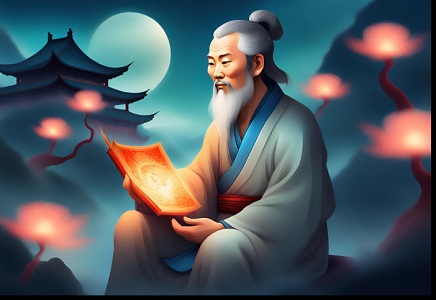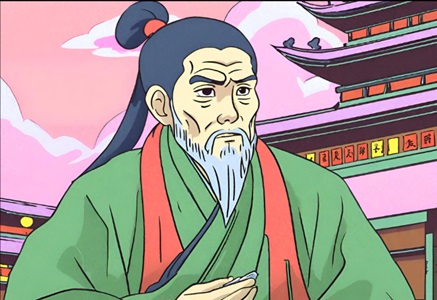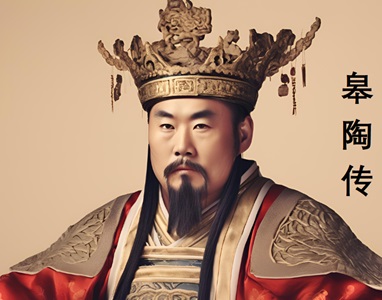Title of Biography in Chinese, Pinyin: 老子:道家之祖的传奇人生(Lǎozi: Dàojiā zhī zǔ de chuánqí rénshēng).
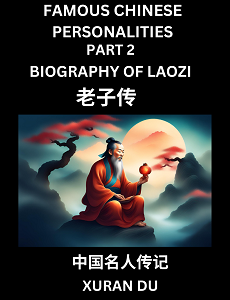
Title of Biography in English: Lao Tzu : The Legendary Life of the Patriarch of Taoism.
Check out books on my Amazon and Barnes & Noble homepages as well as the following pages to learn Biographies of famous Chinese personalities-
- Part 1 – Chinese Biography Book Series for Beginners
- Part 2 – Chinese Biography Book Series for Beginners
- Part 3 – Chinese Biography Book Series for Beginners
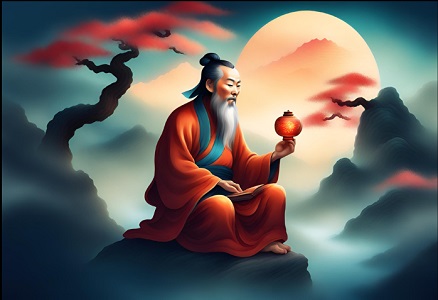
The Biography of Lao Tzu in English (英文传记)
Lao Tzu (Lao Zi), whose original name was Li Er and styled Dan, was a renowned philosopher and thinker in ancient China, and the founder of Taoism. He lived in the Spring and Autumn period, roughly from 571 BC to 471 BC, and was revered as “the Patriarch of Taoism.”

Born into a noble family of the Zhou Dynasty, Lao Tzu was exceptionally intelligent from a young age, harboring a profound interest in the laws governing the universe and all things. Early in his life, he served as a historian in the royal library of the Zhou Dynasty, overseeing the management of imperial archives. This experience afforded him the opportunity to delve deeply into ancient texts, laying a solid foundation for his future philosophical ideas.
However, Lao Tzu was not content with the status quo, and he aspired to pursue a higher spiritual realm. Therefore, he chose to withdraw from society and embark on profound reflections on issues such as the universe, nature, society, and human life. During this process, he introduced the concept of “Tao,” believing that “Tao” is the supreme law of the universe, the source of all things, and the supreme criterion for human behavior.
Lao Tzu’s thoughts were profound and unique. He advocated “governing by non-action,” arguing that the government should conform to natural laws and refrain from excessive intervention in people’s lives. He opposed war and tyranny, advocating peace and tolerance. Meanwhile, he also concerned himself with people’s inner world, proposing the philosophy of “the highest good is like water,” encouraging individuals to maintain a peaceful and humble mindset.

Lao Tzu’s work, “Tao Te Ching,” is a concentrated embodiment of his thoughts. This treatise, with its concise language and profound wisdom, has influenced countless people throughout history. Although Lao Tzu himself left behind few biographical details, his ideas and wisdom will forever remain in the treasury of human culture.
Learn Biography Of Lao Tzu in Chinese (老子的详细传记)
老子,本名李耳,字聃,是中国古代著名的哲学家、思想家,道家学派的创始人。他生活在春秋时期,约公元前571年至约公元前471年,被尊为“道家之祖”。
老子出生于周朝的一个贵族家庭,自幼聪慧过人,对天地万物之道有着浓厚的兴趣。他早年曾任职周朝守藏室之史,负责管理王朝的典籍。这段经历使他有机会深入研读古代典籍,从而为他日后的哲学思想奠定了坚实的基础。

然而,老子并不满足于现状,他渴望追求更高的精神境界。因此,他选择了隐居,开始了对宇宙、自然、社会和人生等问题的深入思考。在这个过程中,他提出了“道”的概念,认为“道”是宇宙间最高的法则,是万物之源,也是人类行为的最高准则。
老子的思想深邃而独特,他主张“无为而治”,认为政府应该顺应自然规律,不要过度干预民众的生活。他反对战争和暴政,倡导和平与宽容。同时,他也关注人的内心世界,提出了“上善若水”的处世哲学,鼓励人们保持一颗平和、谦逊的心态。
老子的著作《道德经》是他思想的集中体现,这部著作以其简练的语言和深邃的哲理影响了后世无数的人。尽管老子本人并未留下太多的生平事迹,但他的思想和智慧却永远地留在了人类文化的宝库中。
Lao Tzu Biography Keywords- English, Chinese & Pinyin (关键词)

- 老子(Lǎo Zǐ): Lao Tzu
- 道家(Dào Jiā): Taoism
- 道(Dào): Tao (the Way)
- 无为而治(Wú wéi ér zhì): Non-action governance
- 道德经(Dào Dé Jīng): Tao Te Ching
Pinyin of Lao Tzu Biography (传记的拼音)
Lǎozi, běnmíng lǐ ěr, zì dān, shì zhōngguó gǔdài zhùmíng de zhéxué jiā, sīxiǎngjiā, dàojiā xuépài de chuàngshǐ rén. Tā shēnghuó zài chūnqiū shíqí, yuē gōngyuán qián 571 nián zhì yuē gōngyuán qián 471 nián, bèi zūn wèi “dàojiā zhī zǔ”.

Lǎo zǐ chūshēng yú zhōu cháo de yīgè guìzú jiātíng, zì yòu cōnghuìguò rén, duì tiāndì wànwù zhī dào yǒuzhe nónghòu de xìngqù. Tā zǎonián céng rènzhí zhōucháoshǒu cáng shì zhī shǐ, fùzé guǎnlǐ wángcháo de diǎnjí. Zhè duàn jīnglì shǐ tā yǒu jīhuì shēnrù yándú gǔdài diǎnjí, cóng’ér wéi tā rìhòu de zhéxué sīxiǎng diàndìngle jiānshí de jīchǔ.
Rán’ér, lǎozi bìng bù mǎnzú yú xiànzhuàng, tā kěwàng zhuīqiú gèng gāo de jīngshén jìngjiè. Yīncǐ, tā xuǎnzéle yǐnjū, kāishǐle duì yǔzhòu, zìrán, shèhuì hé rénshēng děng wèntí de shēnrù sīkǎo. Zài zhège guòchéng zhōng, tā tíchūle “dào” de gàiniàn, rènwéi “dào” shì yǔzhòu jiān zuìgāo de fǎzé, shì wànwù zhī yuán, yěshì rénlèi xíngwéi de zuìgāo zhǔnzé.
Lǎozi de sīxiǎng shēnsuì ér dútè, tā zhǔzhāng “wúwéi ér zhì”, rènwéi zhèngfǔ yīnggāi shùnyìng zìrán guīlǜ, bùyào guòdù gānyù mínzhòng de shēnghuó. Tā fǎnduì zhànzhēng hé bàozhèng, chàngdǎo hépíng yǔ kuānróng. Tóngshí, tā yě guānzhù rén de nèixīn shìjiè, tíchūle “shàngshànruòshuǐ” de chǔshì zhéxué, gǔlì rénmen bǎochí yī kē pínghé, qiānxùn de xīntài.

Lǎozi de zhùzuò “dàodé jīng” shì tā sīxiǎng de jízhōng tǐxiàn, zhè bù zhùzuò yǐ qí jiǎnliàn de yǔyán hé shēnsuì de zhélǐ yǐngxiǎngle hòushì wú shǔ de rén. Jǐnguǎn lǎozi běnrén bìng wèi liú xià tài duō de shēngpíng shìjì, dàn tā de sīxiǎng hé zhìhuì què yǒngyuǎn dì liú zàile rénlèi wénhuà de bǎokù zhōng.
